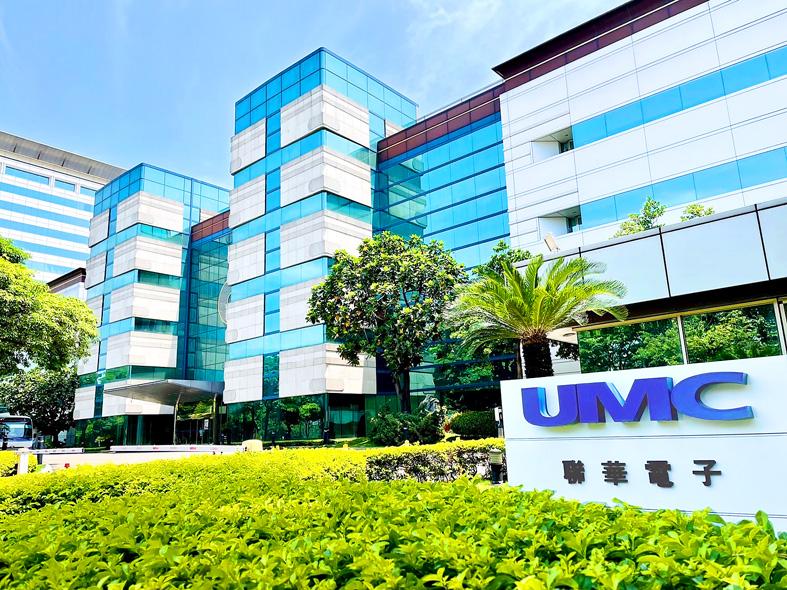United Microelectronics Corp (UMC, 聯電) yesterday declined to comment on a report that the White House had invited the nation’s second-largest contract chipmaker to build a semiconductor fab in Detroit.
UMC said it would not comment on market speculation, but said it had adopted a policy to diversify production and was continuing to assess the possibility of investments abroad.
A report published by the Chinese-language Economic Daily News said that UMC had been invited by the US government to build a 12-inch fab in Detroit.

Photo: Grace Hung, Taipei Times
Such an investment would follow similar moves by Taiwan Semiconductor Manufacturing Co (TSMC, 台積電) and South Korea’s Samsung Electronics Co. Their investments in the US were prompted by Washington amid a worldwide chip supply shortage, especially for automotive chips.
The report said that while TSMC and Samsung would focus on advanced technology development in their US operations, a UMC plant in Michigan would utilize mature 22-nanometer and 28-nanometer processes for automotive chips, which means the contract chipmaker would likely face limited competition from its bigger rivals.
TSMC last year announced it would invest US$12 billion to build a fab in Arizona, with mass production scheduled for the first quarter of 2024, while Samsung said it would invest US$17 billion in Texas, aiming to begin operations in the second half of 2024.
Citing industry sources, the Economic Daily News said that UMC would invest in Detroit, as it is home to the US’ three major automakers: General Motors Co, Ford Motor Co and Stellantis NV’s Chrysler.
The global auto industry has been struggling with a shortage of chips after automakers cut orders for semiconductors on forecasts that remote working and learning amid the COVID-19 pandemic would reduce vehicle sales, leading to inadequate supply once demand returned.
As many auto brands have entered the electric vehicle market, demand for chips used in the cars have also risen, which has exacerbated the shortage, the report said.
To assuage the effects of the chip shortage on the US auto industry, Washington wants UMC to build a fab in Detroit to serve automakers, as the chipmaker continued its efforts to develop semiconductors for automotive electronics, including those used in the advanced autonomous driving systems and “smart car cabins” and entertainment, the report said.
It is possible for UMC to invest NT$100 billion (US$3.51 billion) to set up a semiconductor plant in Detroit with a monthly production capacity of 15,000 to 20,000 units, it said.
UMC said only that the company has a global production plan, and its expansion would be included in its long-term development strategies.
UMC has plants in Taiwan, Singapore, Japan and China.
Last month, its board of directors approved a plan to build a new semiconductor fab in Singapore using 22-nanometer and 28-nanometer processes.
Under the Singapore expansion plan, an advanced manufacturing facility would be built next to its existing 12-inch plant, known as Fab12i, with the planned investment for the project to reach US$5 billion, UMC said.
In the first phase, the new fab would have a monthly capacity of 30,000 units, with production expected to start in late 2024, it added.

SEEKING CLARITY: Washington should not adopt measures that create uncertainties for ‘existing semiconductor investments,’ TSMC said referring to its US$165 billion in the US Taiwan Semiconductor Manufacturing Co (TSMC, 台積電) told the US that any future tariffs on Taiwanese semiconductors could reduce demand for chips and derail its pledge to increase its investment in Arizona. “New import restrictions could jeopardize current US leadership in the competitive technology industry and create uncertainties for many committed semiconductor capital projects in the US, including TSMC Arizona’s significant investment plan in Phoenix,” the chipmaker wrote in a letter to the US Department of Commerce. TSMC issued the warning in response to a solicitation for comments by the department on a possible tariff on semiconductor imports by US President Donald Trump’s

The government has launched a three-pronged strategy to attract local and international talent, aiming to position Taiwan as a new global hub following Nvidia Corp’s announcement that it has chosen Taipei as the site of its Taiwan headquarters. Nvidia cofounder and CEO Jensen Huang (黃仁勳) on Monday last week announced during his keynote speech at the Computex trade show in Taipei that the Nvidia Constellation, the company’s planned Taiwan headquarters, would be located in the Beitou-Shilin Technology Park (北投士林科技園區) in Taipei. Huang’s decision to establish a base in Taiwan is “primarily due to Taiwan’s talent pool and its strength in the semiconductor

An earnings report from semiconductor giant and artificial intelligence (AI) bellwether Nvidia Corp takes center stage for Wall Street this week, as stocks hit a speed bump of worries over US federal deficits driving up Treasury yields. US equities pulled back last week after a torrid rally, as investors turned their attention to tax and spending legislation poised to swell the US government’s US$36 trillion in debt. Long-dated US Treasury yields rose amid the fiscal worries, with the 30-year yield topping 5 percent and hitting its highest level since late 2023. Stocks were dealt another blow on Friday when US President Donald

UNCERTAINTY: Investors remain worried that trade negotiations with Washington could go poorly, given Trump’s inconsistency on tariffs in his second term, experts said The consumer confidence index this month fell for a ninth consecutive month to its lowest level in 13 months, as global trade uncertainties and tariff risks cloud Taiwan’s economic outlook, a survey released yesterday by National Central University found. The biggest decline came from the timing for stock investments, which plunged 11.82 points to 26.82, underscoring bleak investor confidence, it said. “Although the TAIEX reclaimed the 21,000-point mark after the US and China agreed to bury the hatchet for 90 days, investors remain worried that the situation would turn sour later,” said Dachrahn Wu (吳大任), director of the university’s Research Center for